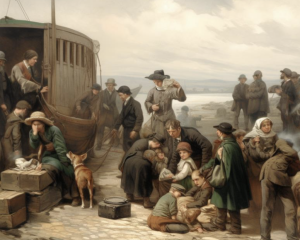For two million Irish men and women, for whom it was just too exhausting to go on fighting the uphill battle against hunger, opportunist landlords and the stony heartlessness of the government,
兩百多萬愛爾蘭人民,他們早已精疲力竭,只能屈服于饑餓,無力反抗投機的地主和鐵石心腸的政府,
there was one more place to trudge to, the ports, which would carry them away to America, Canada, Australia, New Zealand, and, they hoped to God, a better chance, a better life.
他們只能跋涉到港口,坐船離開故土,到美國、加拿大、澳大利亞、新西蘭,誠心祈求上帝能賜給他們更好的生活。
It would be many generations before Ireland's population would recover to the numbers before the potato blight struck.
要歷經數代人,愛爾蘭的人口才能恢復到馬鈴薯疫病大爆發之前。
And in the memory bank of the Irish Diaspora, in Boston, New York or Sydney, the great emptying of western Ireland was above all a British make that an English-plot, little short of genocide.
流浪在波士頓、紐約和悉尼的愛爾蘭子孫的記憶中,愛爾蘭西部的大逃亡就是不列顛人試圖將其英國化,甚至有種族滅絕的傾向。
It certainly wasn't that. Many of the cruelties were acts Irishmen inflicted on each other, just as the Highland clearances had been horrors committed by Scots against other Scots.
當然事實并非如此。許多惡行都源于愛爾蘭人的自相殘殺,就像是高地肅清運動,也正是蘇格蘭人自己的罪行。
But Trevelyan and men like him did subscribe to the "Blessing in disguise" theory, in which, as in India, the road to modernity in overcrowded, unproductive rural economies would always be paved with the ruin of villages.
但是像屈威廉這樣的人卻套用了"因禍得福"這一理論,就像在印度,農村經濟負擔過多人口且生產率低下,要在這里實現現代化,必定伴隨著無數村莊的毀滅。
This is how a contemporary English newspaper summarised it.
一份當時的英語報紙對此作了如下總結。

The truth is, these evictions are not merely illegal, but a natural process, and, however much we may deplore the misery from which they spring,
事實是,這些驅逐行為雖說是非法的,卻也是自然而然的,不管我們怎么譴責這一行為造成的不幸,
we cannot compel the Irish proprietors to continue in their miserable holdings the wretched swarms of people who pay no rent and who prevent improvement the property as long as they remain on it.
我們也不能強制土地持有人將土地交給那些可憐兮兮交不起租金的佃戶,只要佃戶還占有土地,土地就不可能獲得高收益。
For many Irish on both sides of the Atlantic, Trevelyan was to blame.
對大西洋兩岸漂泊的愛爾蘭人來說,屈威廉的確是罪魁禍首。
John Mitchell, a journalist and the most eloquently bitter of the Anglophobes, wrote:
約翰·米切爾,一名記者同時也是一名雄辯的反英者,寫道:
I saw Trevelyan's claw in the vitals of those children. His red tape would draw them to death.
在這些孩子身上我都能看到屈威廉的魔爪。他的惡行最終將會逼死他們。
The price of this religious devotion to the Victorian bible of free trade was a million dead and another two million uprooted as emigrants, more than a third of the total population of Ireland.
此次維多利亞式的自由貿易,代價是百萬人的死亡和兩百萬人背井離鄉移民他國,人數超過了當時愛爾蘭總人口的三分之一。
It was perhaps the greatest peacetime calamity in all of 19th-century European history.
這應該是十九世紀整個歐洲歷史上和平時期最大的災難。
And it happened, not just on the doorstep of the richest country in the world, but inside our own house.
對于當時最富裕的國家來說,這不僅發生在我們身邊,簡直就是在自家后院。
Ireland, after all, had been part of the kingdom since 1801, and this, nationalists would say for generations afterwards, was the bitter fruit of the union.
畢竟自1801年起,愛爾蘭就是王國的一部分,此后上百年,民族主義者都認為這都是統一釀成的惡果。












